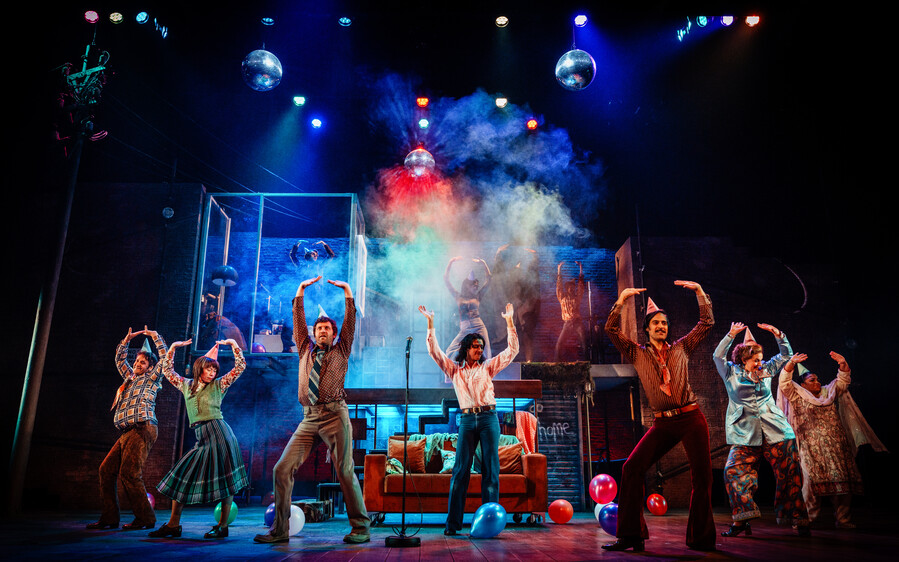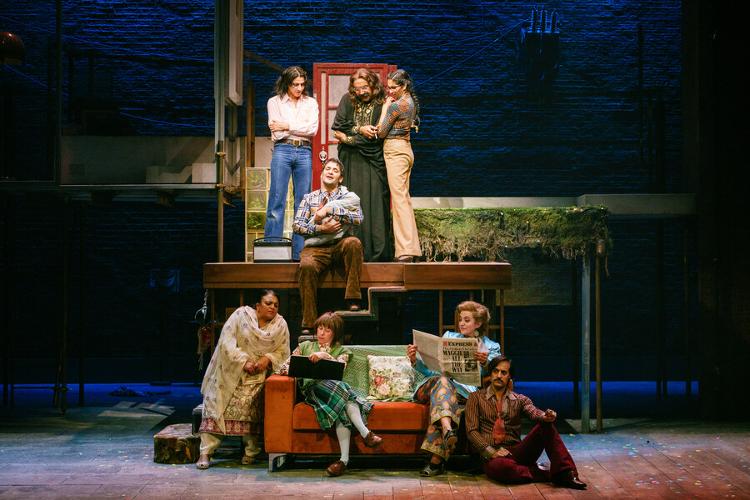Hanif Kureishi’s 1990 novel is brought to life by renowned director Emma Rice, alongside Kureishi, making it’s transfer to the Barbican Theatre. Her playful and exciting style energises the stage, finding a beautiful balance between realism and fantasy in this coming-of-age story.
Set in the late Seventies, a time of political friction, economic hardship, and racial tension, The Buddha of Suburbia reflects themes of identity, family conflict, and cultural assimilation that resonate today. The play’s protagonist Karim, played by Dee Ahluwalia, effectively sets the scene for us at the opening by describing the position of the current economy, whilst also welcoming us into his family home. They play tells us Karim’s story; as a child of an Indian immigrant living in South London, a teenager riding through puberty and sexual endeavours, a budding actor, and simply a boy facing conflicts within his family and friends. Kureishi’s involvement in the adaptation lends authenticity to the production, while Rice’s imaginative style transforms the novel’s complexity for the stage.

The use of multi-rolling is beautifully executed in the production, which is no surprise where Rice is involved. The ensemble skilfully elevate each scene, effortlessly transforming into various characters throughout the show. Particularly notable are Katy Owen and Ankur Bahl as Karim’s parents. The two capture the evolution of a relationship initially grounded in familiarity, only to unravel after an affair by Bahl’s character. As the audience becomes deeply invested in their heartbreaking story, the tone shifts seamlessly when they transition into their next roles, maintaining a steady, engaging flow throughout Karim’s storytelling. Their performances allow audiences to feel the weight of family complexities without losing the production's lively pacing. Their seamless transitions have the audience become engrossed in one emotional arc, and then Owen and Bahl’s transformations into new characters give a sudden comical shift, maintaining an engaging narrative flow that carries us through Karim’s journey.
One powerful example is the character of Changez (played by Simon Rivers), a warm and kind-hearted man adjusting to life in a Westernised culture after arriving in England for an arranged marriage to Karim’s best friend. His experience takes a dark turn when he becomes the victim of an unprovoked attack on the street. This shocking moment resonates intensely when we have seen such abuse within the anti-immigration and racist riots taking place across the country this summer. Although largely a comical tale, the play’s exploration of political tension feels alarmingly relevant in today’s climate.
Visually, the production makes inventive use of Rachana Jadhav’s set design, with its platforms allowing the audience to be intertwined in their scenes, and ensures the expansive stage never feels empty. The play’s brilliant soundtrack also complements the setting, punctuating scenes with music that captures the spirit of the late 1970s, with both British and Asian influences.
Emma Rice and Hanif Kureishi deliver a production that is as vibrant and layered as the novel itself, capturing the humour, pain, and complexity of Karim’s coming-of-age story.
The Buddha of Suburbia runs until the 16th November.
Review: Anna Hulm Photos: Steve Tanner

